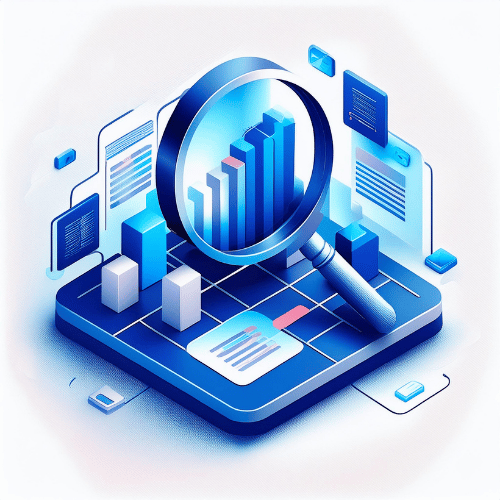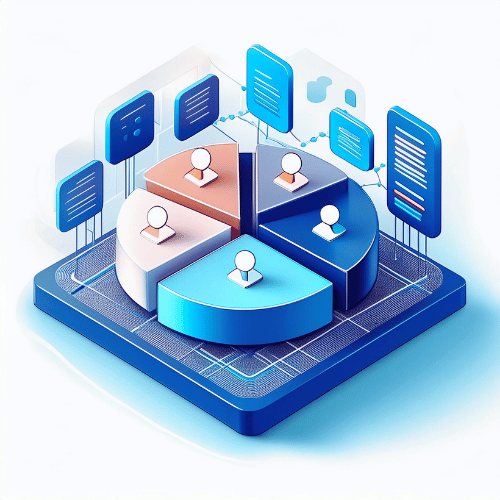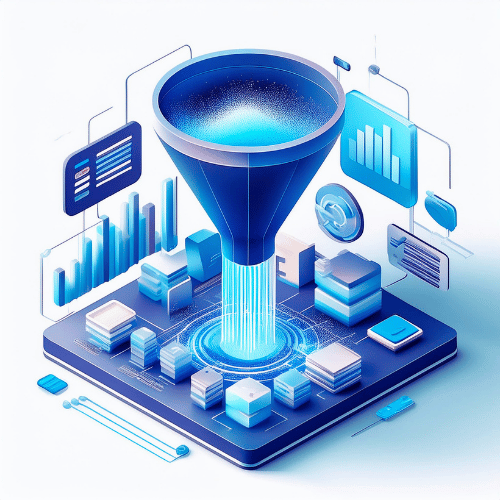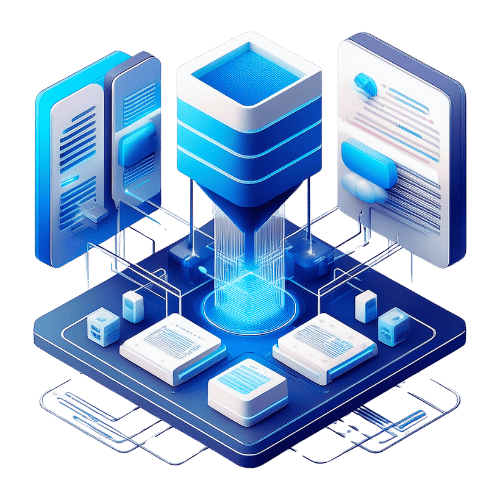In a shifting marketplace, technology and economic changes are transforming sales dynamics. Agentic AI offers a powerful solution by personalising customer interactions and supporting sales teams.
INTRODUCTION
The introduction of technology, along with increasing economic volatility, is changing the dynamics of sales. Buyer’s behaviours are changing, creating a vastly different market from even a few years ago. Businesses need to adapt their sales strategy to stay aligned and accelerate performance.
Agentic AI is a promising technology that gives businesses the capability to implement automated intelligence at scale. This technology personalises interactions at scale, supports sales teams in their work and scales their work. In this blog, we explore how Agentic AI helps overcome some of the most common challenges that businesses face today.
SALES CHALLENGES FACED BY BUSINESS

Prospecting Taking Increasingly Longer
Businesses report their traditional, outbound sales activities are taking longer and are producing less results. In our study, there was a company who reported a 3x increase in required prospecting effort to achieve the same result, increasing both lead time and required effort.
With multiple stakeholders involved and an overload of information, the process of identifying and engaging potential leads is more challenging than ever. This limits the results per head, leading to overall diminished results.
Sales Cycles Take Longer to Close
The length of sales cycles is increasing, with our data pointing to the higher need for personalisation, increased number of stakeholders and buyer information overload as some of the reasons.
Gartner reports that simplifying the buyer experience and managing information overload is one of the key elements to limit sales cycle length. This puts emphasis on the sales team's ability to ensure they take the right actions, make the right decisions and provide highly tailored experiences for each custoer.
Alongside this, Gartner reports that 75% of buyers prefer more online experiences to direct seller engagement. Integrating digital tools with human interactions is complex, which can delay decision-making.


Need for Personalisation
Buyers are expecting an increased level of personalisation, much like B2C environments. IDC's research states that 56% of tech buyers will not engage with sellers unless they personalise their approach.
This push for personalisation puts strain on the sales team as generic collateral is no longer effective and every customer expects tailored experiences. As the time per sales cycle increases, the number of sales cycles per head comes down, impacting overall performance.
Maintaining Quality at Scale
Sales is as much an art, as it is a science. As businesses grow, sales teams grow, and with that comes increased variation in sales approaches and a risk of diminishing quality and control. According to Gartner, 83% of B2B buyers have expressed dissatisfaction with the winning provider in one or more areas of the purchasing process, highlighting the importance of maintaining high-quality interactions.
As the factors we mentioned earlier increase the strain on sales teams, the ability of businesses to maintain their standard becomes even harder.

SALES PRODUCTIVITY AND SCALE
Capabilities
In sales there are a myriad of metrics to look at, like conversion, pipeline growth, deal velocity, average deal size, etc. This can cloud the view of how sales contribute to the bottom line and can make it difficult to quantify what impact investments in sales are having.
Looking at a single metric is crucial to cut through the noise of data, and implementing sales productivity is an excellent starting point. Sales productivity looks at the average revenue per head, considering their real contribution to overall growth. Some examples of good metrics are:
- The net portfolio value increase in subscription-based businesses.
- Customer Acquisition Cost helps e-commerce businesses distribute costs across the customers they acquire.
With the pressures on businesses pointing to increasing complexity, lower productivity, and scaling challenges, sales productivity is becoming the single core metric businesses should target.
Achieving Scale Through Measured Standardisation and Automation
Businesses that are growing, need to scale, and standardisation and automation is still the way forward. This involves finding the best processes for your sales teams, implementing the right key metrics and automating routine tasks.
With the challenges we found in our research, the method to achieve standardisation and scale changes. How can a business achieve scale in an increasingly fragmented sales environment? Personalisation stands at odds with standardisation, and traditional methods in CRM applications, like sequences and collateral templates, simply do not suffice.
This poses the question of how businesses can achieve scale and standardisation whilst managing a more complex and time-consuming sales cycle. Agentic AI holds a key answer to this question, with the ability to leverage intelligent automation.
AGENTIC AI
Why it Matters to Sales?
Increased personalisation and more complex sales cycles put pressure on the performance of sales teams. Adding autonomous intelligence to the tech stack allows more extensive personalisation, and automating steps gives sales time back to focus on customer interactions.
Facts About Agentic AI in Sales
The application of Agentic AI in sales is innovative and new, yet there have already been implementations and results in practice. This offers a good insight into the capabilities of this technology and its potential impact.
Analytium has experimented with potential solutions, implementing Agentic AI for prospecting, sales meeting support and day-to-day coaching of sales reps. Our earlier experiments focused on proving the underlying benefit of Agentic AI; the fact that it is intelligent enough to perform contextual tasks and has a genuine positive impact on the capacity of a sales team.
We have observed that, as you would expect, benefits usually increase linear to the complexity of a solution. A simple meeting transcription and meeting summary solution saves us an hour a day, whilst other solutions like autonomous prospecting and automated deal coaching are more complex and costly yet produce a vastly higher return in time and revenue.
The fact is early experiments have already shown time savings that outweigh the cost of implementing the solutions. It is actively helping us scale.
HOW IT WORKS IN SALES CONTEXT
Technically, AI agents operate in a framework just like a team of chats, to perform a complex task. A supervising agent assigns tasks to specialised agents, which can do anything from analysing customer data, performing online research, drafting emails to giving directions on next steps. A few examples:
Automating Prospecting
Agentic AI automates the prospecting process by identifying high-potential leads and engaging them with personalised content, thus reducing the time and effort required by sales teams.
Note Taking and CRM Integration
AI assists in capturing and organising meeting notes, ensuring that all relevant information is accurately recorded and integrated into CRM systems for future reference. It prepares a meeting summary that the sales representative can send out.
Deal
Coaching
Agents analyse customer interactions and market trends and use your chosen sales methodology to provide actionable insights that guide sales reps to the best next steps to take, boosting overall conversion and revenue.
HOW AGENTIC TACKLES SALES CHALLENGES
1. Prospecting Time and Complexity
Businesses report the effort to gain new opportunities has increased substantially over the last months, putting pressure on sales teams’ time. Agentic AI automates many of the actions required, from gaining new contacts to performing research to personalising outreach. It takes relevant information to autonomously craft and send highly personalised messages to convert those into meetings. Agentic AI does this without human intervention.
RESULT: Prospecting time is minimised by 90% and autonomous intelligence manages increased complexity.
2. Sales Cycle Length is Increasing
Sales cycles are taking longer due to higher complexity, adding more stakeholders, decision cycles and business case evaluations than ever before. Agentic AI analyses all information from previous interactions and proactively suggests appropriate next steps, covering blind spots on stakeholders, value assessments and other areas. As it adopts your sales methodology, agents seamlessly integrate with your sales strategy, and boost conversion.
RESULT: Sales has a real-time assistant that gives deal specific guidance, which boosts conversion and deal velocity.
3. Greater Need for Personalisation
Personalisation goes hand in hand with complexity, as it is often manual work to find the right information and craft a message. Agentic AI, with its access to all data and information, quickly drafts personalised messages and comes up with solutions, supporting salespeople in their day-to-day work, saving time.
RESULT: The legwork of personalisation is done by AI and messages are drafted in the context of previous interactions, achieving hyper-personalisation at scale.
4. Quality at
Scale
The complexity of scaling a sales team often comes down to the individual’s ability to adopt the right methods and adhere to a quality standard. Accelerating growth introduces higher variation leading to more quality issues.
Agentic AI scales without effort and can perform thousands of tasks, at the same quality level as just performing one. You also only pay for what you use, and cost benefits increase as the scale goes up.
RESULT: Agentic workflows apply your standards regardless of scale, allowing you to maintain a higher benchmark as you grow, without the growing pains.
GETTING STARTED
After considering the challenges sales faces and the opportunity Agentic AI presents, let's look at how businesses can get started. When it comes to adopting new AI solutions, Analytium recommends taking an innovative yet thoughtful approach.

Current State of Agentic AI
Generative AI is at its peak of inflated expectations, according to Gartner’s 2024 AI Hype Cycle. This means there is a mismatch in the public’s expectations of a technology, versus its maturity and actual capability. When adopting technologies at that stage, it is important to proceed with care and prioritise specific use cases.
Agentic AI is a relatively new addition to the GenAI mix, and since it leverages core GenAI capabilities that already exist, it presents a unique opportunity to leverage the currently available capabilities in a more complex and new light.
Existing implementations we have seen and done range from the sales examples highlighted in this article, to automating manual systems migrations. In every case, Agentic AI has outperformed expectations.
Start Small, Learn and Scale
To adopt Agentic AI effectively, we recommend taking a thoughtful and analysis driven approach. Analyse the performance of your sales team and find those use cases that harm sales productivity the most. From there, prioritise those use cases by complexity and impact. The cases with high impact and low complexity are the cases you should tackle first.
By starting small, businesses have the opportunity of experimenting with the technology and limiting risk exposure. We often see that once an organisation adopts AI solutions, they are more capable of finding new (and better) ways of enhancing their business with it.


Overcoming the Adoption Barrier
Adopting Agentic AI solutions will face some barriers. For example, there may be security concerns, staff may be concerned if they lose their job and it may not be clear what outcomes the investments in this area will produce.
Businesses should adopt a set of best practices to overcome adoption hurdles:
- Select and implement use cases that demonstrate clear value to the business, paving the way for further projects and adoption.
- Offer educational programmes and training for staff to learn about the new solutions and how it will help them.
- Integrate seamlessly with existing systems that are already present to ease adoption and limit new skills the team must learn.
ANALYTIUM AND AGENTIC AI
1.
2.
3.
INTERESTED IN LEARNING MORE?
Book a Free 30-Minute Consultation
Your business' data has potential and it can reach new heights with a Free 30-Minute Consultation from Analytium! Book a meeting with our expert, Sander De Hoogh, and get personalised insights into optimising your data strategies.
Thank you for considering Analytium. We look forward to helping you achieve your data-driven goals. Click below to schedule your consultation and start transforming your data.
During The Call, You Can Expect:
- A brief analysis of your current data challenges
- Recommendations tailored to your business needs
- An overview of how Analytium’s solutions can drive your success


